This simple poem was written around the time Milton wrote Paradise Lost. Something to ponder.
In my hut this spring
There is nothing
There is everything.
Yamaguchi Sodo (tr. from Japanese by R.H. Blyth)
This simple poem was written around the time Milton wrote Paradise Lost. Something to ponder.
In my hut this spring
There is nothing
There is everything.
Yamaguchi Sodo (tr. from Japanese by R.H. Blyth)
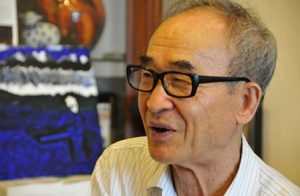 I am a little embarrassed that I have discovered K-dramas, the vast output of Korean soap operas on Netflix. My favorite so far is Navillera (Butterfly) about a 70-year-old retired postman who has always wanted to study ballet. I like the glimpse into modern Korea they provide. I also have discovered a Korean poet whose sensibility appeals to me, Ko Un. Here’s a sample of his work. I like how how he uses the gradual blossoming of spring flowers to knit his divided country together:
I am a little embarrassed that I have discovered K-dramas, the vast output of Korean soap operas on Netflix. My favorite so far is Navillera (Butterfly) about a 70-year-old retired postman who has always wanted to study ballet. I like the glimpse into modern Korea they provide. I also have discovered a Korean poet whose sensibility appeals to me, Ko Un. Here’s a sample of his work. I like how how he uses the gradual blossoming of spring flowers to knit his divided country together:
Spring. Everything’s liberated.
The news of flowers
eases the poverty of this world.
Throughout this fractured country
(some say it’s a pity,
others not so)
spring has come full force.
An azalea blooming at Cheju Island
in the very south,
after a few days
begins blossoming
across the sea
in Southern Cheolla
& Southern Kyeongsang.
A few days later
& it reaches the shore of the Han, mid-country,
& all along the Soyang River.
About a month later
around Hyesan
on the upper reaches of the Yalu, North Korea: blossoms.
At the end of May
about 2700 meters up
by a cold spring at the treeline
azaleas bloom in many colors.
This is enough.
One cannot wish for more.
Where could things be better than among the flowers of a spring day?
So with South & North: gradually, evenly.
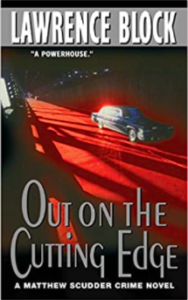 Thanks to Ben Dolnick, I have discovered the mystery writer Lawrence Block. Oddly enough, he’s not in my local public library catalog, but only at UC Library. Unusual for a mystery writer, even one with literary talent. His books are a little hard to find. I love this passage from his Matthew Scudder mystery, Out on the Cutting Edge. In it, the narrator, an unabashed criminal is describing a young woman:
Thanks to Ben Dolnick, I have discovered the mystery writer Lawrence Block. Oddly enough, he’s not in my local public library catalog, but only at UC Library. Unusual for a mystery writer, even one with literary talent. His books are a little hard to find. I love this passage from his Matthew Scudder mystery, Out on the Cutting Edge. In it, the narrator, an unabashed criminal is describing a young woman:
” ‘She was a nice Protestant girl from Indiana,’ he said. ‘She’d steal, but she stole for the thrill of it. You can’t trust that, it’s almost as bad as a man who kills for the thrill of it. A good thief doesn’t steal for the thrill. He steals for the money. And the best thief of all steals because he’s a thief.’ ”
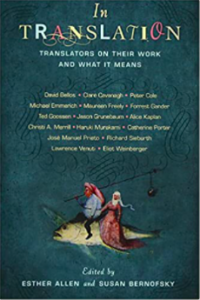 In another vein entirely, but equally pleasurable, here’s a quote from Eliot Weinberger from his essay in In Translation:
In another vein entirely, but equally pleasurable, here’s a quote from Eliot Weinberger from his essay in In Translation:
“Translators sometimes feel they share in the glory of their famous authors, rather like the hairdressers of Hollywood stars.”
So much for what I’m reading today.
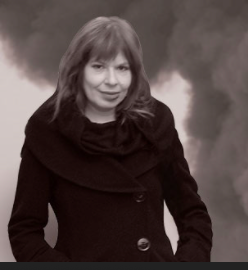 This is from a book called Words for War: New Poems from Ukraine. Of course, the poems here come from the 2014 war, not the current one. How sad for this poor, tattered country.
This is from a book called Words for War: New Poems from Ukraine. Of course, the poems here come from the 2014 war, not the current one. How sad for this poor, tattered country.
When a country of — overall — nice people
turns — slowly — fascist
nice people don’t notice this transformation all at once
As when a person we know intimately
goes, next to us, through
an imperceptible process of aging. Imperceptibly, new wrinkles
slice the skin, frightening, deep.
Nice people nod when they run into each other,
and try, more and more, to lower their eyes,
until finally, raising them becomes an inhuman gesture.
Lyudmyla Khersonska
translated by Valznya Mort
I’ve read a lot of advice on writing, much of it long, drawn out, and not very helpful. Here’s some I like:
Artist’s problem: To get to the best in oneself. And then get away from it.
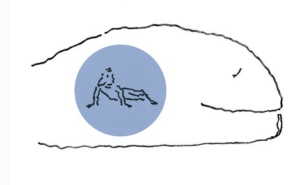 This is a daunting title for a poem, but Lynn Emanuel pulls it off:
This is a daunting title for a poem, but Lynn Emanuel pulls it off:
Like Jonas by the fish I was received by it,
swung and sept in its dark waters,
driven to the deeps by it and beyond many rocks.
Without any touching of its teeth, I tumbled into it
with no more struggle than a mote of dust
entering the door of a cathedral, so muckle were its jaws.
How heel over head I was hurled down
the broad road of its throat, stopped inside
its chest wide as a hall, and like Jonas I stood up
asking where the beast was and finding it nowhere,
there in grease and sorrow I built my bower.
from Noose and Hook
This appeared in the NY Times Magazine in 2015 with the illustration above.